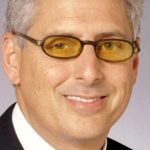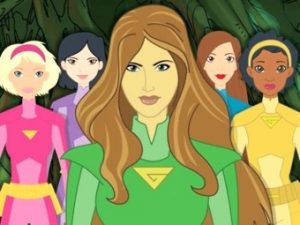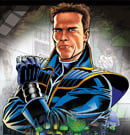Heyward’s way
Andy Heyward’s three-decade career in animation has taken him from the Hanna-Barbera writers’ room to his new toon business, A Squared Entertainment. The producer tells Jesse Whittock about the challenges facing the industry.

Andy Heyward
The Flintstones, Scooby-Doo, The Jetsons, The Real Ghost Busters, Inspector Gadget, Where on Earth is Carmen Sandiego?, Sabrina: The Animated Series… All are considered classic TV cartoons and all have one name in common: Andy Heyward.
As the son of comedy writer and Hollywood studio exec Louis ‘Deke’ Heyward, the younger Heyward was born into animation production. By the late 1970s he was an established writer on The Flintstones and other Hanna-Barbera toons of the mid to late 20th century. In 1982, he created DIC Entertainment after leading an MBO of France’s DIC Audiovisual and went on to develop and executive produce Inspector Gadget, the comic CBS series about a dim-witted cyborg detective.
Twenty-six years later, in 2008, Heyward sold DIC to Canadian firm Cookie Jar Entertainment for US$87.6m, a move about which he says: “I don’t know if there were lessons learned per se. I consider myself a storyteller and I use whatever skills in business I’ve acquired along the way to promote telling stories for kids.”

Gisele & the Green Team
Heyward’s been putting those skills to use in his latest venture, LA-based producer A Squared Entertainment (A2), which launched in 2009 with his wife Amy Moynihan as a co-founder. The firm aims to create content reflecting good old family values with a healthy dose of all-important laughter. “My father was a comedy writer and I was a comedy writer,” says Heyward, “so in everything A2 does today we seek a balance of the appropriate amount of drama, crisis and comedy. We’re trying to be entertaining and bring some smiles into children’s lives. That’s what it comes down to, and we’re hopefully doing it with some positive message woven inside.”
He believes that the husband-and-wife combo provides a “package of complementary skills,” with his background in production combined with Moynihan’s career in media marketing. Her credits include launching Disney’s cruise liner business and a spell as McDonald’s global director of marketing.
Among A2’s productions are Gisele & the Green Team, an environmental-themed series for kids that features model Gisele Bündchen and airs on Cartoon Network in Brazil; and multi-platform series Secret Millionaires Club, which is fronted by an animated version of entrepreneur Warren Buffet and teaches children financial and business literacy. “All you have to do is look in the newspaper and you can see how desperately we need this for our youth today,” says Heyward.
The company is also working on a science-focused show based on light bulb inventor Thomas Edison, again mixing education with humour. “Comedy is the tool used throughout to make these shows engaging for kids,” he explains.

The Governator
It’s not all been plain sailing, however. A planned animated action series with former governor of California and actor Arnold Schwarzenegger, The Governator, didn’t materialise (or, to use a more apt word, was ‘
terminated‘). Despite Arnie’s heavily promoted appearance at MipTV 2011, press revelations about an affair with his former housemaid and an illegitimate son saw the show shelved. There are no plans to revive the project, “but you never say never,” says Heyward.
The Governator represents one of very few failures in Heyward’s long career. Having produced more than 3,000 hours of animated programming, he says the key to success is simple: the storytelling. He thinks The Simpsons is the “gold standard” of modern animation and that “most of the stuff you see on the kids’ channels is pretty good from a comedy point of view.” SpongeBob SquarePants is among his favourites.
Heyward believes some modern producers sometimes rely on style over substance and, besides The Simpsons, doesn’t keep tabs on what’s happening in the primetime toon space, as he’s not keen on the scripts. “At the end of the day, it comes down to storytelling. You have to have better words coming out the mouths of your characters than the words of the characters next door to you.
“It’s not about how much shadowing or multi-play camerawork is going on, or any of the technical stuff; that’s not what engages people. I think back to Hanna-Barbera when I was working on The Flintstones. All it had was pans left to right and mouths moving up and down, but it was so clever and the words were so engaging. Good writing and characters will trump everything.”
A2’s latest move is one that represents a wider trend in animation production: the rise of Indian media groups in Western toon production. In December, the firm partnered with Tata Elxsi, the technology arm of Indian industry giant Tata Group, to form globally focused joint venture A Squared Elxsi Entertainment (A2E2). A2E2 will develop, produce and distribute new cartoons out of Tata’s Visual Computing Labs production studio in Mumbai, India, with Heyward and Moynihan working from the other end on the West Coast in the US.
“Thanks to Tata’s resources, the venture puts us on the map as a global player overnight,” says Heyward. “It’s no secret the Indian economy is burgeoning when everybody else is in stall mode. It has been growing consistently. It has an educated labour pool, is English-language-speaking and is attractive from a cost point of view. That’s a perfect storm for business.”
Former KidsCo and Disney Channels Worldwide chief Paul Robinson joined before MipTV as president of A Squared Elxsi International, A2E2’s newly launched global arm, which will focus on expansion outside the US, where it has been based to this point.
Linking up with Tata is just one method A2 is using to get ahead in the children’s market, but familiar problems remain. “One challenge that exists today – and this goes for almost every production company apart from Disney, which is vertically integrated – is that there’s a very short window of development and production. When you sell a show, you have to get it developed and on-air,” says Heyward.
He notes that when producing Sabrina: The Animated Series for Disney-backed network ABC between 1999 and 2001, he was allowed to redraft scripts “seven, eight or nine times” if necessary, “and if they didn’t like where it was we’d go to the 10th. You can’t do that today unless you have your own channels.
“Inevitably, that means compromise. You just don’t have the will of all to get to the best product you can. I wish the writing was given more time but that’s the nature of this lifecycle right now and the way shows are sold to other parties.”
And compromise is not something that comes naturally. Although international coproduction is often the only way to finance a show, Heyward sees it as a hindrance to achieving the best product. “Personally, I think coproduction is very, very challenging. By trying to invent something by committee, you inevitably get to something that’s washed out. You can’t engineer creativity that way,” he says.
“What you need is an inspired leader who’s going to drive production forward. I hark back to Hanna-Barbera; Joe Barbera would have a great idea and act out the voices to everyone who worked under him. We were lucky to work with a master who had so much inspiration.”
However, Heyward accepts coproduction is a necessary evil for independents, and says while A2 is “driven by creativity,” he acknowledges there are financial targets to meet and “the tail can’t wag the dog. One thing’s for sure, we have to find a way to compete with the likes of Disney, Nickelodeon and Cartoon Network because they have so many resources. We have to operate in a more unorthodox, guerrilla style.”
The strategy is exploiting the digital space, as it can act as both a primary or secondary distribution platform and test bed for new productions. “Digital’s important for everyone at the moment, but it’s more of just a distribution mode; it’s not necessarily about content per se. When we put things online it’s more of an incubation process, where we can see how they’re received and refine them to work better.”
Among A2’s digital shows are Martha & Friends, a 26-episode online series for AOLKids that features a 10-year-old version of American lifestyle guru Martha Stewart; and Super Seven (aka Mighty 7), a multi-platform property featuring comic book legend Stan Lee that’s been two years in development. Gaming and digital are also key elements of the A2E2 initiative.
“Today, you’ve got to be everywhere. You can’t have one fishing rod in one pond,” says Heyward. “You have to be in gaming, online, digital, television, mobile, tablets, home entertainment and apps – all of the places where children consume entertainment. Children are everywhere.”
The uptake of tablets is growing among all consumer demographics and other phenomena, such as social gaming, are emerging (Facebook’s recently announced IPO revealed FarmVille owner Zynga accounted for 12%, or US$445m, of the site’s total revenues in 2011). This makes it increasingly difficult for entertainment production companies to identify which trend to follow. So does the amassed wisdom of nearly four decades in children’s entertainment give Heyward any insights?
“I couldn’t honestly answer that question. [The entertainment business] is like walking through a chandelier shop. There are so many emerging mediums right now and at A2 we need to keep our eye on all of them. For the foreseeable future television is going to be the dominant place for kids to get their entertainment. But then, at the same time, they spend all day on their computers.”
Alternative answers on a digital e-card please.














.jpg)




























